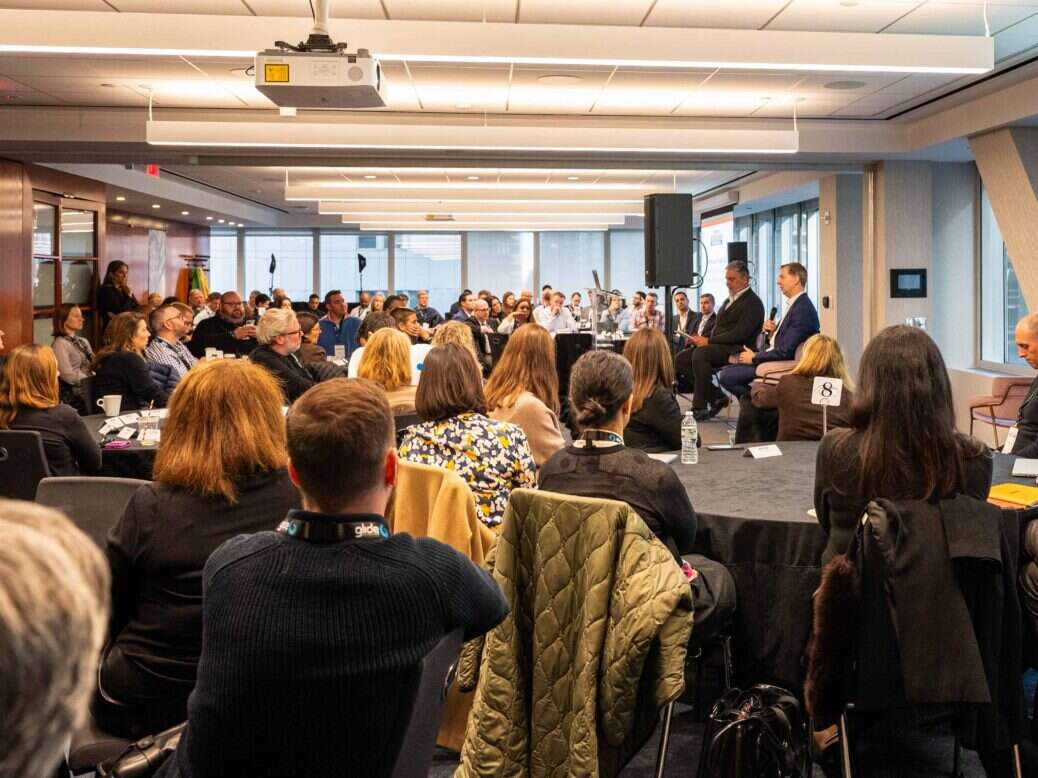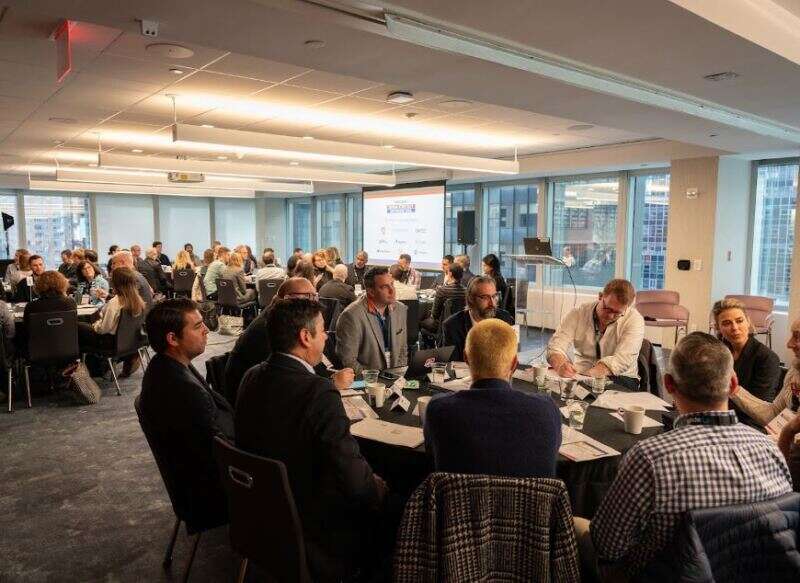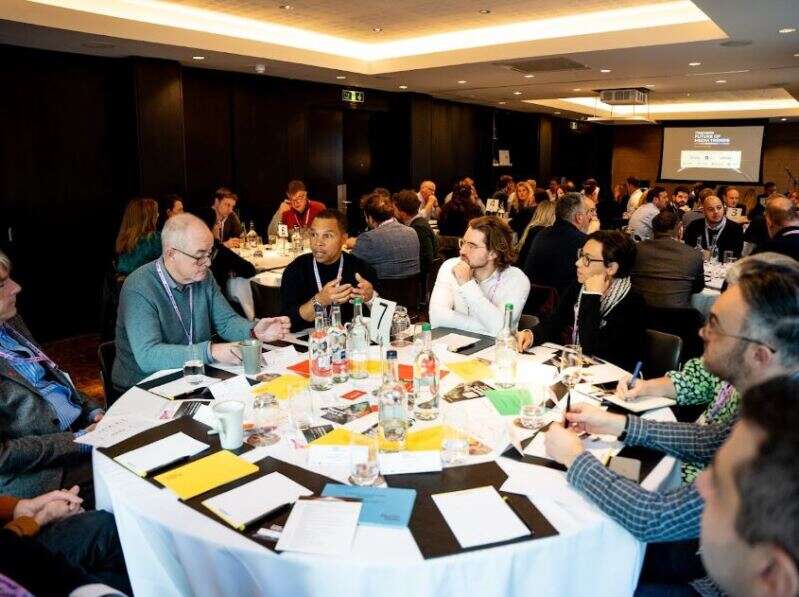
This month I’ve heard the views of more than 200 senior news and media industry executives at Press Gazette conferences in New York and London.
The key feature of both events were roundtable discussions involving every delegate where we tried to thrash out solutions to some of the pressing issues impacting our industries.
The discussions were off the record so I can’t reveal exactly what was said, but I can share a few broad insights.
Publishers have complained about the impact of the tech platforms on their businesses for at least the last decade. But I sense that something has changed on both sides of the Atlantic. Sentiment amongst many publishers has evolved from griping acceptance to a determination that something needs to change over the next year.
I was put in mind of the newscaster in the 1976 film Network who, fed up with reporting on the seeming breakdown in US society, departed from his script and told viewers: “I want you to get up right now. Sit up. Go to your windows. Open them and stick your head out and yell – ‘I’m as mad as hell and I’m not gonna take this anymore!’
“Things have got to change. But first, you’ve gotta get mad!…You’ve got to say, ‘I’m as mad as hell, and I’m not gonna take this anymore!’”
Two countries, same challenges
Press Gazette’s first US conference took place on Lexington Avenue in New York City and featured senior decision makers from many of the country’s top media companies including News Corp, Bloomberg, Hearst, Washington Post, Conde Nast and Dotdash Meredith.
Earlier in the month our Future of Media Trends event in London gathered leading figures from publishers including Newsquest, Reach, News UK, the Telegraph and Future Plc.
While subscription-based businesses like Bloomberg and Dow Jones are still doing well, the vast majority of consumer media publishers are having a tough time in the US. And that spells bad news for democracy and the public’s right to know because independent mass commercial news media is funded by advertising.
The US economy may be more buoyant than the UK one overall, but publishers there are experiencing exactly the same challenges as their colleagues in the UK.
One of the soundbites of our US conference was this: “modestly down is the new up”. So if you are treading water this year or only slightly down then pat yourself on the back, you are ahead of the game.
Be quick or be in decline
Publishers who have managed to hold their position this year are the ones who have been able to quickly pivot towards another revenue stream to make up for the fall in display advertising all seem to be experiencing. Events and affiliate marketing appear be the two places most have been able to make up some of the shortfall. Subscription revenue will numb the pain for those in specialist markets but are only a solution for serving the information-wealthy elite when it comes to the mass market.
Publishers are mad as hell at the tech platforms
Publishers are reporting a steady erosion in search traffic from Google and believe that the platform has downgraded the importance of news. Some are now actively planning for life after Google and accepting that it may not be such an important commercial partner for publishers in the future.
Changes to Google’s search algorithm appear to have downgraded many publisher results.
For instance if I type “best BMW” into Google, the top search results are for places I can buy a BMW, rather than independent advice from motoring publishers.
If you type in “Manchester United” you have to scroll a long way before you get to publisher top stories. Most prominence is given to Google’s own AI-generated results services, tables and player cards.
[Read more: Latest Google updates have led to massive traffic changes for news websites]
There is a feeling that independent content is now playing second fiddle on Google to the sponsored links and its own platform-native content.
Publishers are also particularly concerned about the impact of generative AI being integrated into search.
Many see this as a “we won’t get fooled again moment”. Publishers gave their content away for free in the early days of the internet and now plan to robustly defend their copyright material in the face of wholesale plundering by ChatGPT and others.
While many publishers are experimenting with generative AI to help create content and streamline back-office tasks, these uses look unlikely to be game-changing. There are concerns, however, that by stealing content and using it to train AI systems which answer questions without citations, generative AI systems like ChatGPT pose an existential threat to the news business.
Online advertising model is broken
My biggest take-home from both events was the feeling that something has gone deeply wrong this year in the online advertising ecosystem.
The advertising market on both sides of the Atlantic is growing. But the revenue share going to publishers is decreasing.
This appears to be partly due to growing concerns around data privacy and a diminishing ability for publishers to serve personalised advertising. This trend will only accelerate with the end of publisher cookies on Google’s Chrome browser in 2024.
There is also concern about lazy buying tactics from advertising agencies. Publishers know that quality journalism is a great place to serve advertising, yet agencies find it easier to spend their money with the tech platforms – who deliver a huge a audience at a cut price but with little accountability over how and where advertising will appear.
Overall, there is deep suspicion that the overall architecture around online advertising has become a casino rigged in favour of the tech platforms at the expense of publishers.
I don’t know what the answer is yet to this problem, though it may begin with some education for agencies around sustainable and responsible ad buying – as was mooted at another New York event last week by a former media agency boss.
One thing I do know is that if ad-funded news media is going to survive in the digital age, publishers need to co-operate and realise (if they don’t already) that they need to work together in a fight for survival versus the tech platforms.
Press Gazette’s publisher round-table events
Press Gazette’s Media Strategy Network USA event was held at 601 Lexington Avenue in New York City on 15 November and featured contributions from: Dow Jones CEO Alma Latour, Christine Cook (chief revenue officer Bloomberg Media), Pamela Drucker Mann (global chief revenue office Conde Nast), Alex MacCallum (chief revenue officer Washington Post), Lisa Howard (chief revenue officer Hearst Magazines), Shacar Orren (co-founder EX.CO), Jennie Baird (EVP digital news and streaming, BBC), Wendy Brundige (SVP CNN digital worldwide) and Ariscielle Novicio (head of technology, New York Post). It also featured a number of round-table discussions featuring around 100 media leaders.
It was sponsored by: EX.CO, Permutive, Vindicia, InsurAds, Q5 Partners, Glide Publishing Platform, 10Up, LineUp Systems, eMagazines, Factor Eleven, Brand Newsroom and House of Kaizen.

Press Gazette’s Future of Media Trends event at South Place Hotel in London on 9 November featured contributions from Google managing director for partnerships Chris Thorogood and Newsquest CEO Henry Faure Walker. It also featured round-table discussions from around 100 media leaders.
It was sponsored by Permutive, EX.CO, amply/ Jobbio, LineUp Systems, Vindicia, Arc XP and Human Made.

Email pged@pressgazette.co.uk to point out mistakes, provide story tips or send in a letter for publication on our "Letters Page" blog
